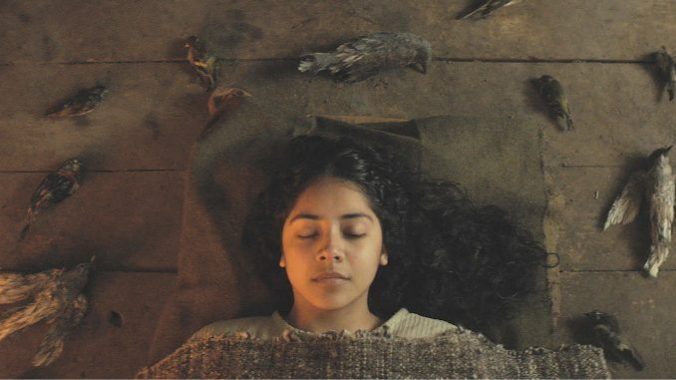Magical Chilean Revenge Tale Sorcery Casts a Slow, Tantalizing Spell

Chiloé, the largest island of an archipelago off the coast of Chile, rose from the volcanoes populating the far southern sea. In Sorcery, its Indigenous Huilliche people claim to be from the sea as well. Heaven, the invention brought over by the colonizing Europeans, isn’t for them. They’ve got different designs and a different fate, especially when the Christians repress them. Shapeshifting warlocks practice a magic closely tied to the natural world, deployed in dire circumstances—something that appeals to the teenage Rosa (newcomer Valentina Véliz Caileo) after her father is murdered by their white employer. The dark, brooding coming-of-age drama can be ponderous and blunt, but its liberating magic casts an infectious spell.
Christopher Murray bases his fantastical period piece on a real trial that took place in 1880, where an alleged tribunal of warlocks were put on trial for ruling the island as a kind of shadow government. Adding in a burgeoning mystic as our eyes and ears through the hardship, racism and pain afflicting her people, Murray simplifies the setting by turning it into a revenge tale. We still get a sense of the island—its damp forests, foreboding caves, and bountiful beaches, as well as the gulf between the sheepskinned natives and the suited intruders—but the larger community is reduced to Rosa’s pain, those that inflicted it and Mateo (Daniel Antivilo), the gruff warlock leader who takes her in.
Throughout, Rosa is faced with bleakness. This is a grim-looking film, shot by cinematographer Maria Secco in brutal, muddy, unwelcoming browns and grays. We linger on whipping scars, stung by seawater, and cruel deaths, delivered one dog bite at a time. The hurt is intentionally centered, leaving a space for an equalizing rebuttal. Thankfully, we get that too. As Rosa slowly unlearns her indoctrination (that she’s not Huilliche anymore, but a good and acceptable Christian), it frees up room for her latent powers. The script tells us these things simply, spelled out after long sequences of silence: After her father is murdered, the church turns Rosa away, while every settler she encounters—Spanish or German—condescends to her and rejects her attempts at assimilation. Mateo is the only one who would take her, so she’s roped into his spells by default.
But the magic itself is winningly tactile and earthy. While I can’t boast any claims as to its accuracy (Murray and his co-writer Pablo Paredes mostly come from a background of political documentaries and dramas), it’s certainly an engagingly visual way to convey the cost of this power. Mateo is clear that the Indigenous people are closer to their homelands than the foreigners, who have flighty ideas about zipping off to the clouds after they die. Mateo and those like him, Antivilo growls behind his beard, can use the local flora and fauna to a variety of ends. Dead birds help with sorrow. Handmade rope, woven into circles, can knock out a whole flock of sheep. And skin, dried and bound? Skin can change things.
-

-

-

-

-

-

-

-

-

-

-

-

-

-

-

-

-

-

-

-

-

-

-

-

-

-

-

-

-

-

-

-

-

-

-

-

-

-

-

-








































